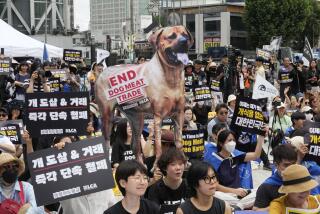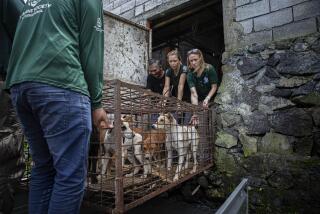British Farmers Have Bone to Pick Over Beef Ban
- Share via
LONDON — The British government has a controversial warning for a nation of beef lovers: If you fancy cuts like T-bone steak, standing ribs and oxtail, eat ‘em quick. Starting next week, a dinner of beef on the bone could be followed by jail for dessert for some.
Despite angry farmers, supported by derisive carnivores, the Agriculture Ministry said officially Monday that as a public health precaution it will ban sales of beef on the bone in Britain effective next Tuesday.
The ban is intended to guard against the longshot spread of the human variety of “mad cow” disease, known to scientists as bovine spongiform encephalopathy and to British consumers as BSE.
“This measure has the support of consumers who recognize that my priority is their protection,” said Agriculture Minister Jack Cunningham in a letter Monday to organizations of farmers and consumers and to the food and restaurant industries.
The ban is more bad news for a nation in which beef has been a family staple and an icon from the 15th century, when it came to symbolize the relative wealth of the ordinary English. Shakespeare loved his beef; Hogarth caressed it on canvas; and on the eve of a new century, the stalwart Beefeaters still guard the 900-year-old Tower of London.
Even in these cholesterol-conscious times, beef remains an English passion. Take it from Lee Chadwick, who is throwing a big beef party at his Royal Oak pub in Yorkshire next week--bones ban be damned. “People have had more than enough of witless, self-seeking politicians and bureaucrats telling them what they can and cannot eat and drink and in the process destroying people’s livelihoods,” Chadwick said. “What will they do, send the marrow police after me?”
Scientists last year linked BSE, first reported in the mid-1980s, to a new strain of the degenerative human brain condition Creutzfeldt-Jakob disease, or CJD, which had claimed 22 lives in Britain through the end of October. Early research pointed to brain, eye, spinal cord and small intestine tissue of older cows as a potential source of infection.
But new findings announced last week showed the slight risk of transmission through bone and bone marrow of cattle.
Despite stiff regulations that forbid any cow older than 30 months from entering the food chain, British beef is banned for export within the European Union; internal demand has rebounded since the CJD crisis exploded last year. Indications last week that the government would strengthen its domestic controls, though, brought quick and angry response in the streets from Britain’s 70,200 cattle farmers.
Already beleaguered by low beef prices in the face of increasing imports encouraged by a strong currency, thousands of farmers blocked ports up and down the coast. Their targets were trucks carrying imported beef. Several truckloads of hamburger from Ireland were dumped into the sea off Wales.
“I just hope that the minister realizes how enormously serious the situation is and how desperately worried farmers are about their future,” said David Naish, head of the National Farmers Union.
By some estimates, farm income has slumped between one-third and one-half in the past three years. Some government help is in prospect, but farmers union advertisements in British newspapers this morning warn that Britain’s entire rural economy is at risk.
Naish said after meeting county chairmen Monday that they were “furious, anxious and deeply concerned about the future of all sectors of farming.”
Five farmers were arrested for blocking the road at the English Channel port of Dover, and two were held in Lancashire, hundreds of miles to the north. In the southern port of Portsmouth, farmers pelted foreign trucks with eggs.
Patriot farmers made the protests sound like a transatlantic echo of the Boston Tea Party. “We are respectable people who have been forced into this action,” said Hugh Richards, a farmer from Kent. “We have justices of the peace, town councilors, parish councilors--all the most respected members of the community.”
Farmers believe the on-the-bone ban will aggravate their woes, and they have evoked strong support from beef eaters, civil libertarians--and statisticians.
John Pattison of the University College London medical school, one of the scientists who did the bone research, estimated that there was a 5% chance of a single new CJD case this year as a result of allowing beef to be sold on the bone.
Taking a global view of the CJD threat, the establishment newspaper the Telegraph estimated that the chance of any one individual contracting the disease from eating beef on the bone in any one year was 1 in 600 million. The chance of winning the National Lottery is 1 in 14 million and of being hit by lightning 1 in 10 million, the paper noted.
Other critics are quick to point out that alcohol and tobacco kill many more people in Britain than CJD ever has, without provoking a draconian government sales ban.
In his letter Monday to 400 affected groups, Cunningham invited comment on details of new legislation. But it has been clear since late last week that the government decision to ban beef on the bone had already been made.
Under the new measures, all beef from carcasses over 6 months old, whether of domestic or foreign origin, must be cut off the bone before being sold. Cattle are typically slaughtered in Britain between 18 months and 24 months of age.
Not even Fido gets a break; butchers will be forbidden to sell or give away bones. And bones will be banned from the human food chain, meaning they cannot be used to make stocks, soups or broths, or to produce animal fats. Penalties will range from six months to two years in jail, and fines will start at up to $8,000; the levies could be much higher in serious cases.
All of which outrages people like pub keeper Chadwick and his clients. “I’ve just ordered three boxes of oxtail, four large standing ribs, six shins of beef and 30 T-bone steaks,” he said Monday at his pub near Harrogate in northern England. “My butcher said he is overwhelmed with orders.”
Chadwick says he plans to host a special “British Beef on the Bone” dinner three days after the new ban goes into effect. “This is not just a stunt; this is a genuine protest. There are a lot of furious people here, and all of us believe that the farmers need supporting,” he said.
Columnist John Casey complained in Monday’s Evening Standard newspaper that the new ban is just one more piece of accelerating, unnecessary government control over people’s lives. “The unspoken rule is: ‘Whatever you are doing--stop it!’ It has all become so habitual that we are losing the energy to protest. What was once satirical fantasy is fast turning into absurd reality,” he said.
More to Read
Sign up for Essential California
The most important California stories and recommendations in your inbox every morning.
You may occasionally receive promotional content from the Los Angeles Times.













